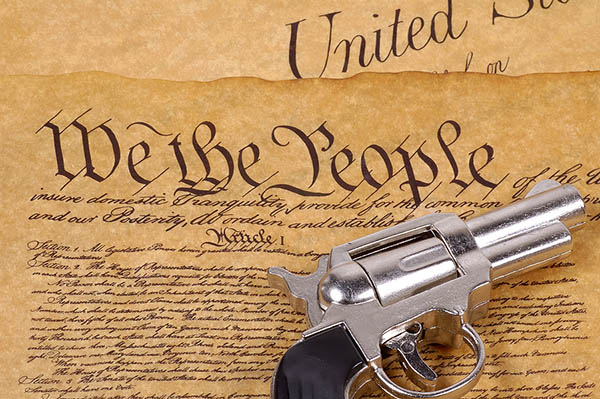Facing legal challenges from both gun rights advocates as well as the criminal defense bar, New Jersey Attorney General Christopher Porrino on October 20, 2017 issued a memorandum to prosecutors and police departments halting the enforcement of criminal laws that prohibit the possession, manufacture, and shipment of “electronic arms” such as stun guns and Tasers. The legal challenges to New Jersey’s stun gun laws were triggered by a 2016 decision of the Supreme Court of the United States, Caetano v. Massachusetts, in which the Court applied the Second Amendment to strike down a Massachusetts law that prohibited the mere possession of stun guns, even if possessed for self-defense.
In Caetano, the defendant, a female victim of domestic violence who lived in Massachusetts, armed herself with a stun gun for protection from an abusive ex-boyfriend after several restraining orders had proved futile. When the ex-boyfriend accosted and threatened the defendant outside of her workplace, she brandished the stun gun. Even though she did not use the stun gun, the defendant was arrested and charged with illegally possessing the stun gun, consistent with Massachusetts law.
Eventually, Caetano made its way to the Supreme Court of the United States on a challenge to the constitutionality of the Massachusetts law. Such a challenge became possible after the Supreme Court of the United States held, in the landmark 2008 decision of District of Columbia v. Heller, that the Second Amendment protects an individual’s right to possess a firearm unconnected with service in a militia for traditionally lawful purposes, such as self-defense within the home. Even though stun guns are not lethal or typically associated with military uses, the Court in Caetano struck down the Massachusetts law on constitutional grounds, holding that it violated the Second Amendment as interpreted by Heller.
Because New Jersey has maintained an absolute ban on the possession of stun guns since 1985, the Caetano decision triggered a legal assault on the New Jersey stun gun laws, which would presumably be struck down as unconstitutional if challenged. Accordingly, the New Jersey Attorney General, after being sued by the New Jersey Second Amendment Society and facing constitutional challenges in several criminal cases, agreed to stop enforcing provisions of New Jersey law that criminalize the possession and sale of stun guns in New Jersey.
Under the memorandum, the provisions of New Jersey Criminal Code that will no longer be enforced include:
- N.J.S.A. 2C:39-3(h), which makes it a crime of the fourth degree for any person to knowingly have in his possession any stun gun, to the extent this statute outright prohibits, under criminal penalty, individuals from possessing electronic arms; and
- N.J.S.A. 2C:39-9(d), which makes it a crime of the fourth degree to manufacture, transport, ship, sell or dispose of certain weapons, to the extent this statute prohibits the sale or shipment of stun guns such as Tasers or other electronic arms in New Jersey.
Other provisions of the Criminal Code pertaining to stun guns remain in effect, however. These include:
- N.J.S.A. 2C:39-4(d) — possession of a weapon (which is defined to include a stun gun) with a purpose to use it unlawfully against the person or property of another;
- N.J.S.A. 2C:39-4.1 — possession of a stun gun with a purpose to use it unlawfully against the person or property of another (subsection b.) or under circumstances not manifestly appropriate for such lawful uses as it may have (subsection c.), while in the course of committing certain drug offenses;
- N.J.S.A. 2C:39-5(d) – possession of a stun gun under circumstances not manifestly appropriate for such lawful uses as it may have;
- N.J.S.A. 2C:39-5(e)(2) —possession of a stun gun while in or upon any part of the buildings or grounds of any school, college, university or other educational institution without the written authorization of the governing officer of the institution; and
- N.J.S.A. 2C:39-7(a) —prohibition against “certain persons” with prior criminal convictions from purchasing, possessing, or controlling a stun gun.
Finally, the Superintendent of State Police proposed a rule, published at 49 N.J.R. 2765(a) (August 21, 2017), that would maintain the prohibition on sale and possession of stun guns to minors under the age of 18. Accordingly, the Attorney General advised that:
- The prohibition under N.J.S.A. 2C:39-3(h) of possession of a stun gun may still be enforced against possession by minors under the age of 18; and
- The prohibition under N.J.S.A. 2C:39-9(d) of the sale or shipment of stun guns in New Jersey may still be enforced against the sale or shipment of stun guns to minors under the age of 18.
Thus, the possession or use of a stun gun or Taser by someone over 18, and in a lawful fashion, such as for self-defense, will no longer be enforced, though techinically it remains a crime. However, the possession or use in an unlawful fashion, for instance to commit an assault or other type of crime, will still be enforced.

Leave A Comment